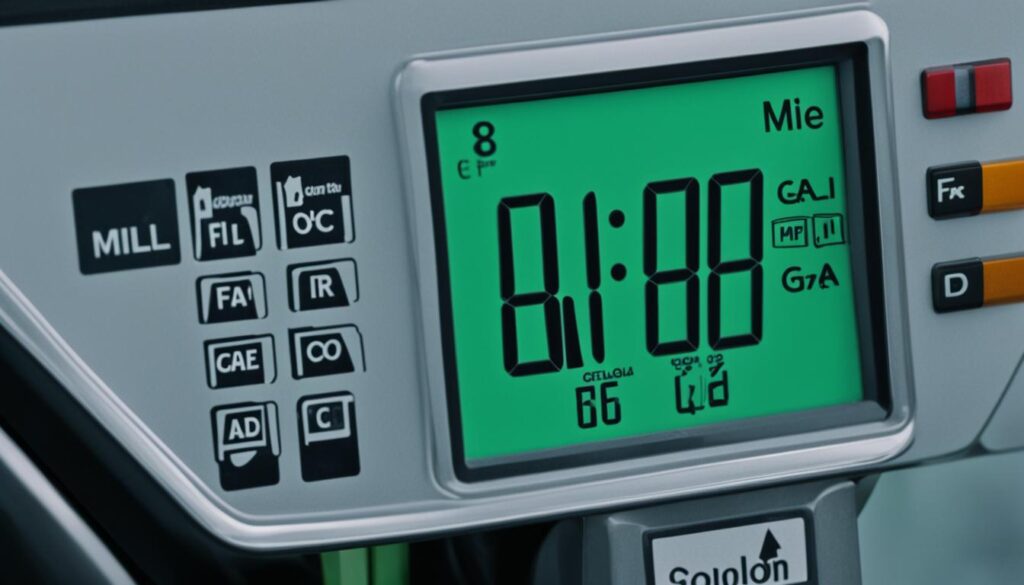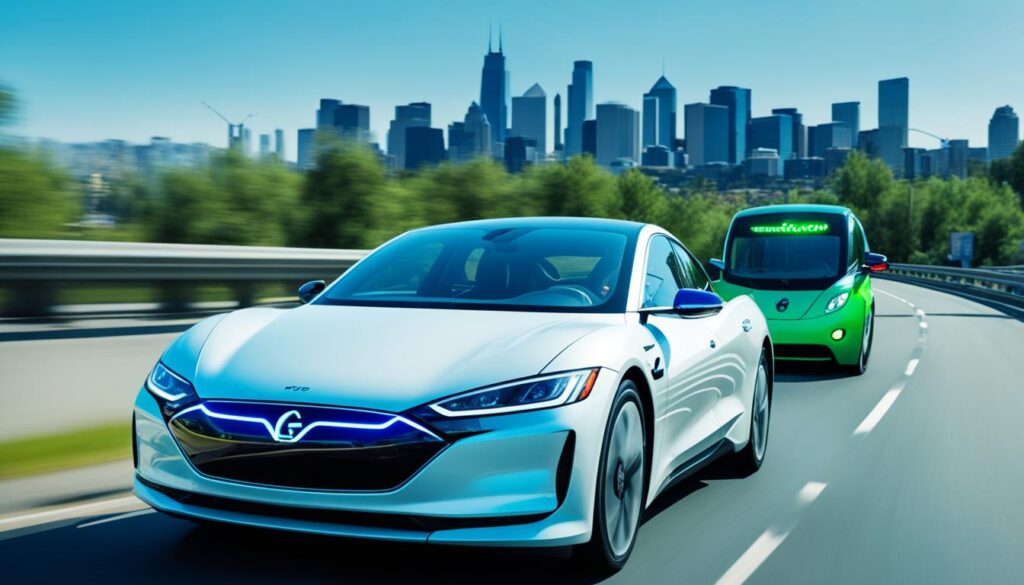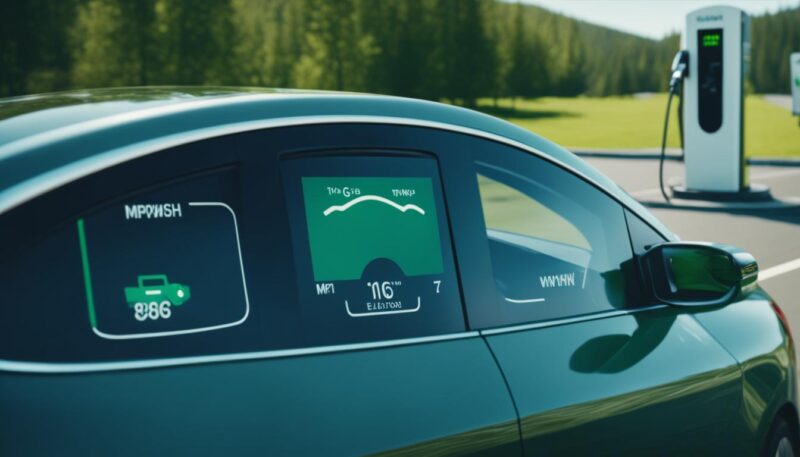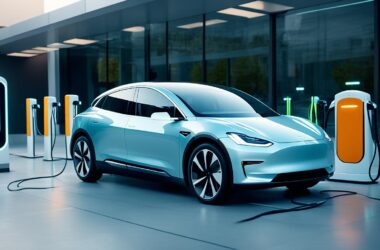Converting MPG (miles per gallon) to MPKWH (miles per kilowatt-hour) is crucial in understanding and optimizing your vehicle’s fuel efficiency. By making this conversion, you can compare energy consumption rates and make informed decisions for eco-friendly driving. In this guide, I will provide you with a simple and accurate step-by-step process to convert MPG to MPKWH.
Key Takeaways:
- Converting MPG to MPKWH helps you understand and optimize your vehicle’s energy efficiency.
- Using a gas mileage calculator can make the conversion process easier and more accurate.
- Understanding MPKWH allows you to compare energy consumption rates and make eco-friendly driving choices.
- Miles per Pound (MPP) is another important metric for comparing vehicle consumption rates and costs.
- Calculating MPP involves considering fuel economy figures and the average price of fuel or electricity.
Understanding Miles per Pound (MPP) – A Comparative Measure
Miles per Pound (MPP) is a valuable metric that allows you to compare the running costs of different types of vehicles, including petrol, diesel, hybrid, plug-in hybrid, and battery electric vehicles (EVs). It takes into account various factors such as range, energy consumption (mpkWh), and fuel economy (mpg), providing an insightful comparison of the overall running costs.
MPP figures are calculated using complex formulas that consider average fuel/energy efficiency and fuel/electricity costs. By analyzing the MPP figures, you can gain a better understanding of the affordability and eco-friendliness of different vehicle options. This information empowers you to make informed decisions when it comes to your transportation choices, helping you save money and reduce your environmental impact.
To illustrate the usefulness of MPP, let’s take a look at a scenario. Consider two vehicle options: Vehicle A, a petrol car with an mpg rating of 40, and Vehicle B, an EV with an mpkWh rating of 4. For simplicity, we’ll assume the cost of petrol is £5 per gallon, and the cost of electricity is £0.15 per kWh.
In order to calculate MPP for each vehicle, we need to consider the fuel/electricity cost and the energy consumption. For Vehicle A:
- Cost per mile = (£5/gallon) / (40mpg) = £0.125/mile
- MPP = Cost per mile / (£1/pound) = (£0.125/mile) / (£1/pound) = 0.125 miles/pound
For Vehicle B:
- Cost per mile = (£0.15/kWh) / (4mpkWh) = £0.0375/mile
- MPP = Cost per mile / (£1/pound) = (£0.0375/mile) / (£1/pound) = 0.0375 miles/pound
In this example, Vehicle B (the EV) has a significantly higher MPP value compared to Vehicle A (the petrol car). This indicates that the EV offers better fuel efficiency and lower running costs in terms of miles per pound. By utilizing MPP as a comparative measure, you can make more informed decisions when it comes to vehicle selection, taking into account both environmental and economic factors.
Benefits of Using MPP
MPP offers several key benefits when assessing vehicle consumption and comparing running costs:
- Accurate Comparison: By considering factors like energy consumption and fuel economy, MPP provides a direct and accurate comparison of the running costs between different types of vehicles.
- Eco-Friendly Driving Tips: Understanding MPP can guide you towards eco-friendly driving practices, such as choosing vehicles with better fuel efficiency and lower energy consumption.
- Budget-Friendly Decisions: By evaluating the MPP figures, you can identify vehicles that offer greater value in terms of running costs, helping you save money in the long run.
- Reduced Environmental Impact: MPP allows you to assess the eco-friendliness of different vehicle options, encouraging the adoption of more sustainable transportation solutions.
How to Calculate Miles per Pound (MPP) for Your Car
Calculating Miles per Pound (MPP) for your car is a straightforward process that involves considering the fuel economy figures (WLTP) and the average price of fuel or electricity in the UK. For electric vehicles (EVs), the calculation incorporates energy consumption figures like miles per kilowatt-hour (mpkWh) and the corresponding cost per kilowatt-hour of home charging or public charging stations.
Let’s break down the steps to help you calculate MPP:
- Start by determining the fuel economy figures for your vehicle. This can typically be found in the manufacturer’s specifications or sometimes displayed on the vehicle’s dashboard.
- Next, find the average price of fuel or electricity in your area. Prices can vary, so consider obtaining this information from reliable sources such as government websites or local energy providers.
- For traditional petrol or diesel vehicles, divide the fuel economy figure (in miles per gallon – MPG) by the average price per gallon. This will give you the cost of driving one mile in pounds.
- For electric vehicles, divide the energy consumption figure (in miles per kilowatt-hour – mpkWh) by the cost per kilowatt-hour of charging. This will also provide you with the cost of driving one mile in pounds.
It’s important to note that MPP figures are regularly updated to reflect changes in fuel and electricity costs. However, keep in mind that these figures serve as a general guide and may not precisely reflect your actual running costs. Individual driving habits, charging station prices, and electricity tariffs can influence the final calculations.
Now, let’s take a look at a hypothetical example:
| Vehicle | Fuel Economy (MPG) | Average Fuel Price (per gallon, in GBP) | MPP (GBP) |
|---|---|---|---|
| Ford Focus | 45 | 1.30 | 0.029 |
| Nissan Leaf (EV) | 3.5 mpkWh | 0.15 (per kWh) | 0.043 |
Note: The above table is for illustrative purposes only and does not reflect current market conditions.
Interpreting the Example:
The Ford Focus achieves a fuel economy of 45 MPG and with an average fuel price of £1.30 per gallon, it costs approximately £0.029 to drive one mile.
The Nissan Leaf, an electric vehicle (EV), has an energy consumption figure of 3.5 mpkWh. With an average cost of £0.15 per kilowatt-hour of charging, it costs approximately £0.043 to drive one mile.
By comparing the MPP values of different vehicles, you can gain insights into their respective fuel or energy costs. This information can be valuable when considering the affordability and efficiency of various transportation options.

Comparing EVs with Miles per Pound (MPP)
When it comes to electric vehicle efficiency and running costs, Miles per Pound (MPP) figures are a valuable tool. These figures allow for direct comparisons between EVs and petrol/diesel cars, helping you make informed decisions about your transportation options. By assessing MPP figures, you can gain insights into how much you’re likely to spend on refueling your car in a year and compare the costs of charging an EV at home versus refueling a traditional car.
Let’s take a closer look at how MPP figures provide clarity on the cost-effectiveness of EVs compared to conventional vehicles. By considering the running costs and energy consumption of EVs, you can make a more eco-friendly and budget-friendly choice for your transportation needs.
“MPP figures offer key insights into the running costs of EVs versus petrol/diesel cars. They help consumers evaluate the affordability and efficiency of different vehicle options, allowing for informed decisions.”
To better understand the advantages of EVs, here’s a comparison of electric vehicle efficiency, EV running costs, and miles per pound figures:
| Electric Vehicle | MPG Equivalent | Operating Cost per Mile (£) | MPP Figure |
|---|---|---|---|
| Tesla Model 3 | 141 MPGe | 0.04 | 0.11 |
| Nissan Leaf | 99 MPGe | 0.03 | 0.12 |
| Volkswagen Golf | 29 MPG | 0.08 | 0.06 |
As shown in the table above, electric vehicles like the Tesla Model 3 and Nissan Leaf offer significantly higher MPG Equivalent (MPGe) values compared to conventional petrol/diesel cars like the Volkswagen Golf. This indicates better electric vehicle efficiency, allowing for more miles per kilowatt-hour.
Furthermore, when evaluating operating costs per mile (£), EVs prove to be more cost-effective, with lower values compared to petrol/diesel cars. This is due to the lower cost of electricity compared to traditional fuel. The MPP figures reflect this, showcasing the higher efficiency and lower running costs of EVs.
In conclusion, using miles per pound (MPP) figures provides a practical way to compare electric vehicles with petrol/diesel cars in terms of energy efficiency and running costs. These figures help consumers make informed decisions about their transportation choices, promoting eco-friendly and budget-friendly options. With higher MPGe values and lower operating costs per mile (£), electric vehicles prove to be a promising alternative to traditional vehicles, paving the way for a more sustainable future.
Exploring MPGe – An Alternative Metric for EV Efficiency
When it comes to measuring the efficiency of electric vehicles (EVs), hybrid cars, and other non-gasoline vehicles, one commonly used metric is MPGe, which stands for Miles Per Gallon Equivalent. MPGe compares the energy consumption of these vehicles to the energy equivalent of a gallon of gasoline. It provides a standardized way to gauge the efficiency of EVs by expressing their energy consumption in terms of the equivalent miles per gallon.
MPGe values are calculated based on the precise amount of electric energy that is equivalent to the energy in one gallon of gasoline. This allows for a direct comparison between EVs and traditional fossil fuel-based vehicles. However, it’s worth noting that MPGe can sometimes be confusing and less practical than other metrics, such as miles per kilowatt-hour (mpkWh), when it comes to assessing EV efficiency.
MPGe numbers often include charging losses, which are the energy losses that occur during the process of charging an EV’s battery. These losses can vary depending on factors such as temperature, charging speed, and battery condition. As a result, MPGe may not always accurately reflect real-world energy consumption and efficiency.
While MPGe provides a useful benchmark for comparing different EV models, it’s important to consider other factors, such as driving conditions, vehicle weight, and individual driving habits, which can affect energy consumption and overall efficiency. Therefore, using additional metrics like mpkWh can provide a more comprehensive understanding of an EV’s performance in terms of energy efficiency.
MPGe vs. mpkWh: Which Metric to Use?
“MPGe provides a useful benchmark for comparing different EV models, but when it comes to assessing real-world energy consumption and efficiency, mpkWh offers a more practical and accurate metric.”
MpkWh, or miles per kilowatt-hour, directly measures the number of miles a vehicle can travel on one kilowatt-hour of electricity. This metric focuses solely on the energy efficiency of the vehicle in motion and eliminates the ambiguity that charging losses can introduce. By using mpkWh, you can easily compare different models of EVs and assess their real-world range and energy consumption.
Unlike MPGe, which includes charging losses in its calculations, mpkWh provides a more accurate representation of an EV’s energy efficiency and allows for a more direct comparison between different EV models. It is a simpler and more practical metric that can help consumers make informed decisions when choosing an electric vehicle based on their specific range and energy efficiency needs.
Overall, while MPGe remains a relevant metric for comparing EV efficiency, using mpkWh alongside it can provide a more comprehensive understanding of an EV’s energy consumption and performance. By considering these metrics together, consumers can make more informed decisions about which EVs offer the best balance of energy efficiency and range for their specific needs.

Why Miles per Kilowatt-Hour (MpkWh) is a Better Metric
Miles per Kilowatt-Hour (mpkWh) is a superior metric for evaluating the efficiency of electric vehicles (EVs) compared to other metrics like MPGe. With mpkWh, you can accurately measure the number of miles an EV can travel using one kilowatt-hour of electricity. This straightforward metric provides a clear picture of a vehicle’s energy efficiency in motion, focusing solely on its performance and range.
Compared to MPGe, mpkWh eliminates the consideration of charging losses and other factors, giving you a more precise understanding of an EV’s energy consumption. By using mpkWh, you can easily compare different EV models and assess their real-world range and energy efficiency. This allows you to make informed decisions when choosing an electric vehicle that aligns with your preferences and requirements.
A key advantage of using mpkWh is its practicality. Unlike other metrics, mpkWh directly translates into real-world electric vehicle range. For example, if an EV has an mpkWh rating of 4, it can travel 4 miles on one kilowatt-hour of electricity. This simple conversion allows consumers to quickly gauge an EV’s energy efficiency without the need for complex calculations or conversions.
Furthermore, mpkWh empowers consumers to evaluate electric vehicle efficiency in a meaningful way. By considering mpkWh ratings, you can easily compare different EV models and make an informed decision based on their energy consumption and range capabilities. This knowledge enables you to select an EV that meets your specific driving needs while maximizing energy efficiency.
Comparing EV Efficiency Using mpkWh
Let’s compare the energy efficiency of two popular electric vehicles: the Tesla Model 3 and the Nissan Leaf.
| Electric Vehicle | mpkWh | Range (Miles) |
|---|---|---|
| Tesla Model 3 | 4.2 | 250 |
| Nissan Leaf | 3.6 | 150 |
As shown in the table, the Tesla Model 3 has an mpkWh rating of 4.2, allowing it to travel 250 miles on one kilowatt-hour of electricity. In contrast, the Nissan Leaf has an mpkWh rating of 3.6, providing a range of 150 miles on the same amount of energy. This comparison clearly demonstrates the superior energy efficiency and extended range of the Tesla Model 3.
By using mpkWh as a metric, you can easily evaluate the energy efficiency of EVs and make informed decisions based on their performance and range. Whether you prioritize long-range capabilities or energy conservation, understanding mpkWh is essential for finding the electric vehicle that meets your needs while promoting sustainable transportation.
With mpkWh as the go-to metric for evaluating electric vehicle efficiency, consumers can make informed decisions when choosing their next environmentally-friendly mode of transportation. Whether you’re considering an EV for its energy efficiency, reduced emissions, or long-term cost savings, mpkWh provides a reliable benchmark to compare different models and assess their real-world performance.
Conclusion
Optimizing your vehicle’s energy efficiency is essential for eco-friendly driving and reducing your environmental impact. By converting MPG to MPKWH and understanding metrics like Miles per Pound (MPP) and Miles per Kilowatt-Hour (mpkWh), you can make more informed decisions about your transportation choices.
Both MPP and mpkWh provide valuable insights into running costs, range, and energy consumption, allowing you to compare different vehicles and choose the most cost-effective and sustainable option. For those considering an electric vehicle, mpkWh is a straightforward and practical metric that accurately reflects energy efficiency in motion.
Whether you’re driving an electric vehicle or maximizing fuel efficiency in a traditional car, these energy-saving transportation techniques can make a difference. By adopting eco-friendly driving habits and utilizing metrics like MPP and mpkWh, you can contribute to a cleaner and greener future while enjoying the benefits of cost savings and reduced environmental impact.










priligy kaufen If you or your doctor are planning to stop or change your steroid prescription, ask your doctor if you are likely to experience withdrawal symptoms, based on how long you have taken steroids and how much